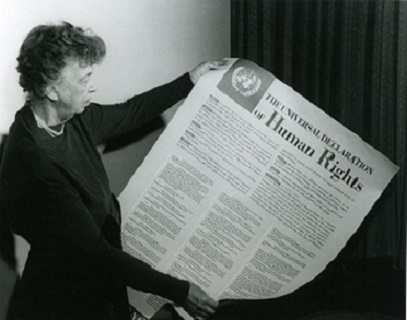The Universal Declaration of Human Rights (UDHR), ratified 75 years ago on December 10, 1948, for the first time articulated the rights and freedoms to which every person is entitled.
At the first United Nations General Assembly session in 1946, the newly formed organization proposed the creation of a document that would promote universal respect for human rights and fundamental freedoms. “All human beings are born free and equal in dignity and rights,” reads the first article of the UDHR.
“They are endowed with reason and conscience and should act toward one another in a spirit of brotherhood.” Influenced by the core values at the heart of the U.S. Constitution, the UDHR affirmed that “the equal and inalienable rights of all members of the human family is the foundation of freedom, justice and peace in the world.”
Former U.S. first lady Eleanor Roosevelt (pic) chaired the U.N. Human Rights Commission, which was tasked with creating the framework for the document. Roosevelt worked with the 17 other members of the commission, including representatives from France, Lebanon, China and Canada, to create the UDHR over the course of two years.
Under Roosevelt’s leadership and guided by American principles of liberty and freedom, the U.N. ratified the UDHR. Available in more than 500 languages, the UDHR is the most translated document in the world.
Championing human rights — and the defenders of those rights — remains a U.S. government priority. The Department of State’s Global Human Rights Defender Awards, issued annually, honour people around the world who have shown leadership and courage while promoting human rights and fundamental freedoms.
“The United States has worked to make real our own commitment to the Universal Declaration on Human Rights — both here at home but also around the world,” Secretary of State Antony Blinken said at a December 7 meeting of human rights advocates in Washington. “Defending human rights, affirming human dignity, simply put, reflects our values, reflects who we are.”











